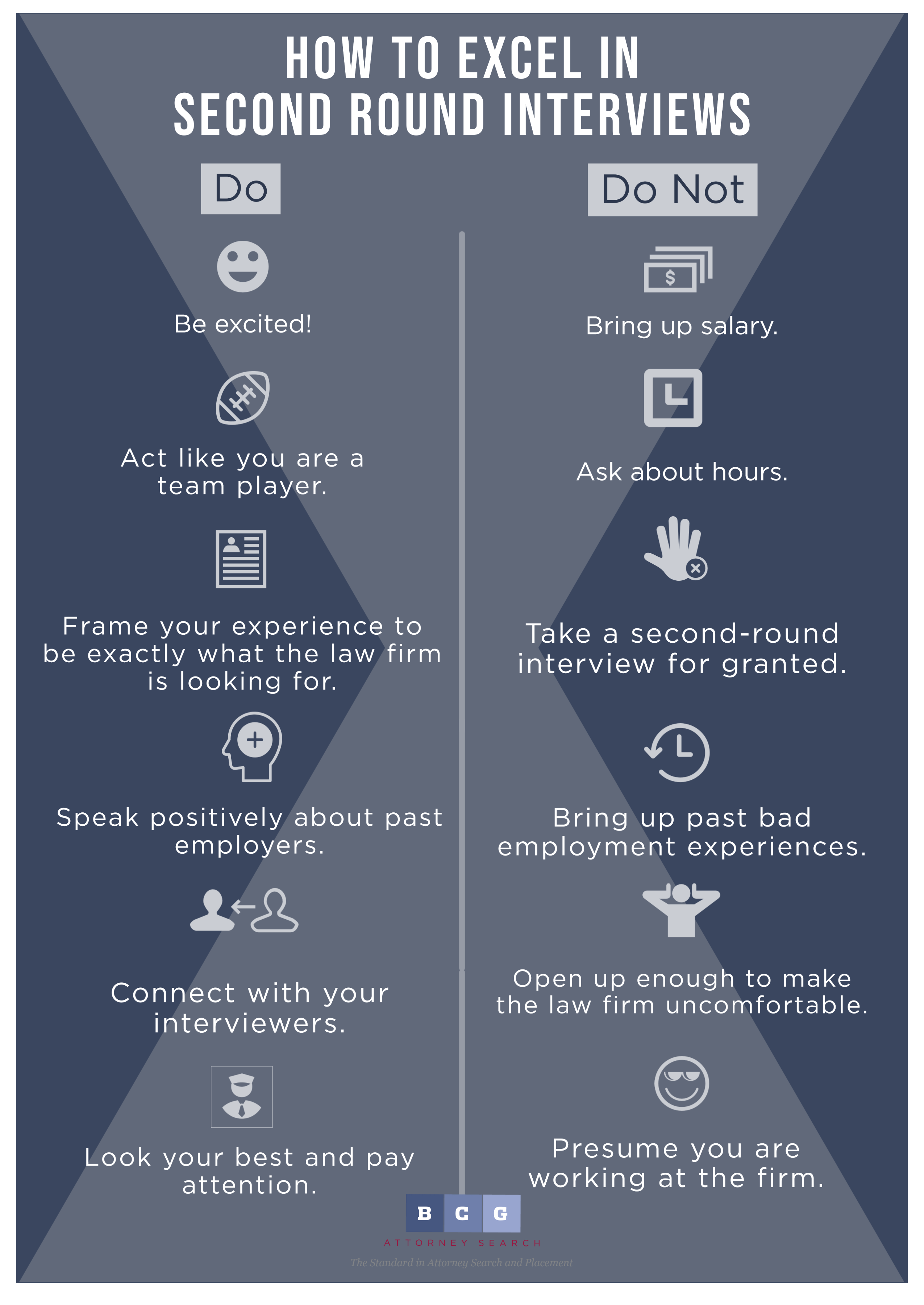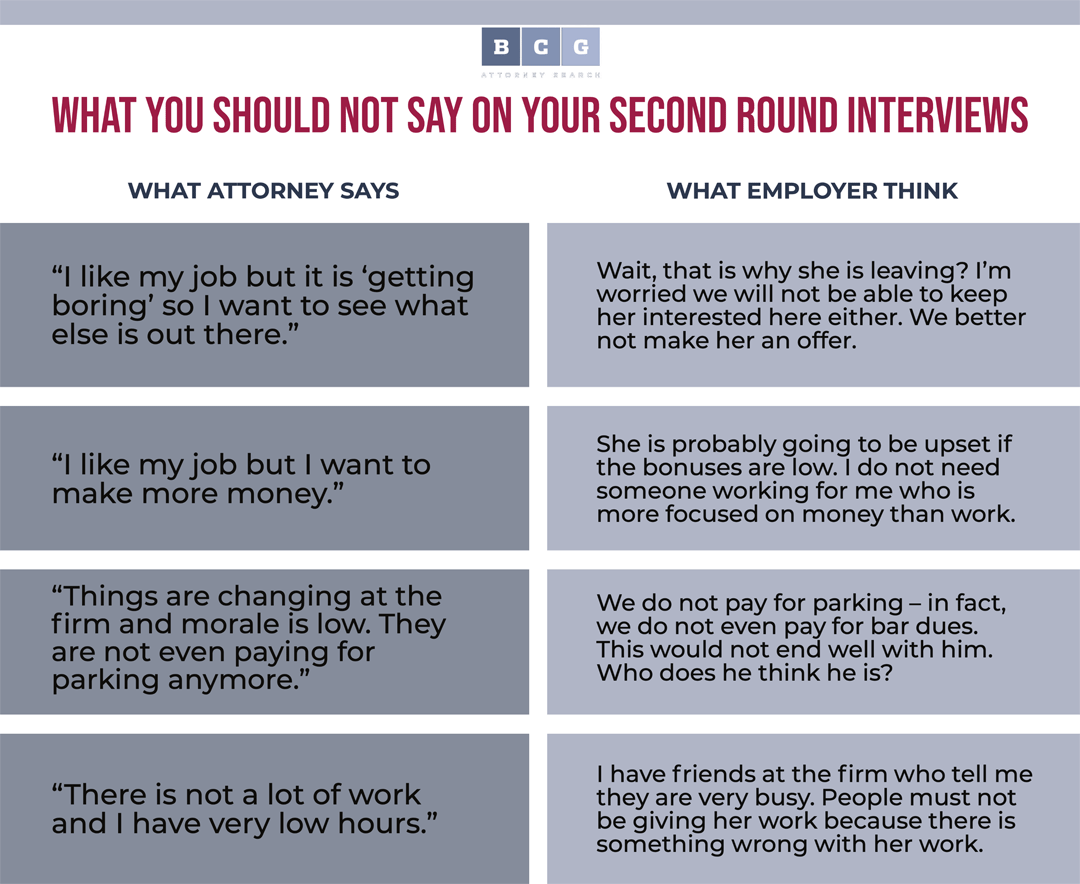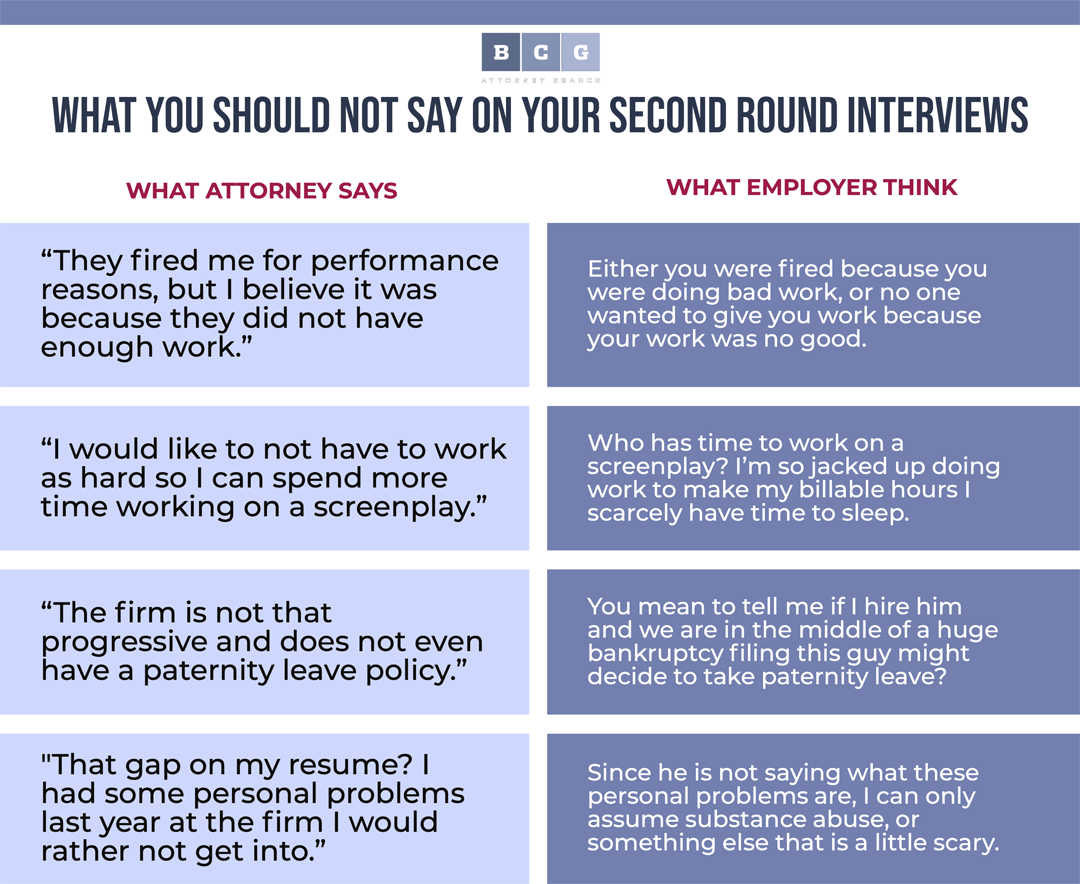- Interviews are just like dating!
- Avoid coming off too confident or difficult to control.
- Keep reading to find out why attorneys who do well in first round interviews may not excel in second round interviews.
Summary: Have you passed the first law firm interview and are about to go back for round two? Learn how to impress a law firm during second round interviews.

Last week, I spoke with a candidate who has been unemployed for over a year. I was initially surprised that he had been unemployed for so long, given his apparently stellar qualifications. But I soon realized the problem: He was making mistakes in the way he handled himself during second round interviews and as a result he was not getting job offers.
“I always get past first interviews with law firms, but after a second round interview they never hire me,” he told me. “They seem to like me after the first time they meet me but not after.”
- It is not uncommon for attorneys with strong qualifications to consistently “blow” second round interviews. In fact, I have spoken with attorneys who may have been on 25+ second round interviews over the course of a year and still not gotten a single job offer. Obviously, something is very wrong: The attorney is able to get in the door and invited back but is not able to “close the deal.” I am going to tell you what these attorneys are doing wrong so that you do not make the same mistakes.
- It is not uncommon for attorneys with average qualifications to consistently “crush” every second round interview and almost always get offers. These are attorneys who tell me “just get me in the door” and proceed to always get job offers, seemingly no matter what and every time. There are things that these attorneys know how to do that other attorneys do not. I am going to tell you what these attorneys do so that you can get offers from as many second round interviews as possible.
A law firm job search can be an ordeal, especially when the process involves (1) applying for jobs, (2) getting first round interviews, (3) doing well at first round interviews, (4) going to second round interviews and then (5) not getting an offer. Attorneys who consistently lose out after second round interviews end up hurt and bewildered. I will help you avoid this by sharing several foolproof law firm call back interview tips in this article.


|
|
|
Imagine how you would feel if this happened to you 20+ times over six months. It can be devastating – and after so many failures many attorneys simply give up practicing law. Some find themselves being divorced by their wives, who cannot figure out why they cannot get a job. Others become incredibly depressed and take jobs way beneath them. The inability of attorneys to do well in second round interviews is a serious problem, but the good news is that it is also easily fixable if you know the rules.
In this article I discuss what to do and what not do in second round interviews so you get more job offers. Keep reading to learn how to ace your call-back interview with a firm.
The Entire Interview Process Is No Different Than Dating
Fifteen years ago I started the registration process on Match.com and filled out a form with my age, location and so forth. I was single at the time and curious about what the site was all about. I never completed the registration process, but it did not matter. Match.com immediately began sending me profiles of women at least once a day to try and get me to sign up for the site. The site had me tagged as an “employer” interested in “hiring” and like an employment agency began to market people to me that I might want to hire. The profiles I received were just like resumes.
- If I was single and saw something in one of the pictures and corresponding descriptions that I liked, I might try and meet the person for coffee (“a screening interview”).
- If the screening interview went well, I might try and meet the person for a more formal “first date” such as dinner (“a second round interview”).
- If the second round interview went well, then there would be a strong possibility of something more formal developing and I might even have a new girlfriend (which would be “an employee”).
- If the dating went well I might propose marriage (which would be a “partnership”).
With its first and second round interviews, the law firm employment market is quite similar to dating. If a firm has let recruiters, job boards, or others know that it has an opening then the odds are that the firm needs someone – and is “single.” If a law firm needs someone then that firm is definitely looking to hire and hoping that someone comes along who is an appropriate applicant for the open position. In fact, law firms generally want all of the people they interview to work out. They are hopeful things will work out because it saves time and eliminates the need to bring in other people for interviews. Law firms actually want you to do well and not screw up the interviews.
Most busy professionals are not interested in tons of meetings with potential mates. Meeting lots of people is work and takes time and energy. They are hoping each time they meet someone for coffee that they are meeting the “right” person so they can stop “screening” additional people and take everything to the next step. Once they go out on a first date, both sides are hoping the other side does not do something stupid to screw everything up so they can move forward.
The Decision to Interview You Generally Does Not Involve a Lot of Thought
For a law firm, the initial decision to interview you is generally quite simple. The law firm sees something in you that it likes—your experience, your qualifications, or something else—and brings you in. Generally, the decision to bring you in is largely based on your resume, experience, reputation, connections and other things you do not have a ton of control over. You can certainly tailor your resume for a given position, but for the most part getting in the door is going to be a product of your resume and the story you or your recruiter tells about you to get you in there.
In the online dating world, the equivalent would be that someone saw your picture and read a little bit about you and liked what he or she saw. Your background loosely matched what that person was looking for and that person decided it might be worth having a meeting. The person reading your profile may have liked the books you read, your preference in pets, your hair color, or your religion – who knows. The only thing you need to know is that there is interest on one side and for whatever the reason the person wants to meet you. Some people are very selective and may look at 200 profiles before deciding to talk to you.
This is generally the same sort of process employers follow as well. They may be just as selective reviewing your resume and decide to speak with you based on something they see and like. They may like your experience, education, where you last worked, the fact that you were a college athlete – who knows. They see something they like and want to meet with you.
The First Round/“Screening” Interview
The first round interview in a law firm is generally a fairly quick affair and not a lot is involved. The law firm may bring you in to speak with one person for 20 to 30 minutes, or may have you speak with two or three people for a few short meetings. The meeting may be with one partner over coffee. Oftentimes the meeting will be a phone meeting with a partner and in some cases a Skype meeting. The meetings are short and generally will not go into a lot of detail. The meeting is a chance to make a quick connection and see if there is enough there to go deeper.
The person you are meeting with in a first round interview wants to like you. The person is not eager to spend a lot of time interviewing a bunch of people in 15 to 30 minute increments and as a lawyer would rather be billing hours and dealing with clients. The interview is more of an annoyance for most of these interviewers and they hope they will not have any issues with you.
In first round interviews (when they are done in person) the partners interviewing you are basically asking themselves whether they would be comfortable working with you, whether you seem presentable, whether you appear to be someone they would be comfortable having work with their clients and whether you have good reasons for wanting to join their firm. They need someone to do the work and in order to succeed in a first round interview you need to come in and give them the impression that you want the job and are the perfect person for them.
At this preliminary stage, most attorneys do very well. They come across as enthusiastic and willing to work. They smile. They are deferential and the attorneys who interview them are often “convinced” that the attorney is fine to move to the next round. This is why most attorneys get second round interviews.
The first round interview is no different than a coffee date generated from a dating site. The two people meet for a short time and if everything appears as advertised then things move on to the next stage. There is some simple chitchatting, each side makes sure there is a connection and then things move forward. There is not always a connection. Perhaps the profile does not seem to fit the person or maybe one side is a horrible conversationalist or difficult to connect with. Sometimes there is no chemistry or there is simply a personality mismatch.
In general, however, the first interview is no different than a quick meeting between two people to see if there is any interest after seeing each other’s profile. They want to make sure that what is represented matches what they were told “on the surface.” A subsequent meeting is only scheduled if everything seems acceptable at this point.
This article is primarily about second round interviews – but as an aside I should note that while many attorneys do fine at first round interviews I have seen lots of people make fatal first round interview mistakes such as acting like they already have the job and/or coming across as
- too confident,
- difficult to control,
- angry,
- withdrawn,
- critical,
- desperate,
- annoyed, and/or
- uninterested.
These are, of course, the same ways that people can damage their first “coffee dates” as well. In general, however, most attorneys want to get hired and so they do not do any of these sorts of things early on in the interviews. That is why for the most part people do not blow their first round interviews. For more information on how to perform well during initial interviews, please see the following article:

The Second Round Interview
Attorneys who know what they are doing generally have no difficulty with second round interviews either. Attorneys who know what they are doing understand that they need to do and say the right things for their audience. Here is a way to look at this:
If you were running for political office as a Republican, there are certain things you would say and do that you would never do if you were running for office as a Democrat. If you were running for political office as a Democrat, there are certain things you would say and do that you would never do if you were running for office as a Republican.
YOUR AUDIENCE: Here, your audience is a law firm.
WHAT THEY WANT: When a law firm is hiring you the firm is hiring you to either be a worker, or someone who brings in business and work (a partner). If you are a worker (someone who is being hired to do other people’s work), you are expected to do what is asked of you, and not be someone with personal issues and demons that will interfere with the work the law firm needs done.
You simply are expected to work hard and do what is asked of you and nothing more. Your audience only makes money when you bill a lot of hours and they expect you to do this—and be happy for the work when it is there. The law firm is a business and as a business it needs your ability to do work.
The law firm has no use for your problems, wants, needs, or desires. The law firm is a business serving corporations and businesses and it needs people who will just do excellent work, work hard, stick around and produce results. It needs people who will not create drama and have issues and problems. That is your audience.
Your audience may like you to be interesting, have outside interests and so forth (as long as these help you remain productive), of course – but this is permissible only as long as it does not interfere with the law firm’s objectives.
You always need to remember that the law firm’s objectives and mission is much greater than your own. The law firm has more money and power and can always find someone else to do your job – the more individualistic and needy you are, the less conformist and unlikely to fit its objectives, the less likely you will be hired.
Imagine that you are a single woman interested in settling down and having children and put out an advertisement on a dating site to find a husband. Imagine if the men you started going out on first dates with told you that they had never had a long term relationship and did not want one, were having a difficult time holding down a full time job and did not know if they really wanted to ever have children. That would throw you for a loop and you probably would not go out with any of them again.
Fatal “Red Flags” Often Emerge in Second Round Interviews
This is exactly what happens to law firm employers in second interviews. They interview people who send out all sorts of horrifying signals – “red flags” – that they are not likely to work out and are likely to be problematical for what the employer needs. Incredibly, they start saying everything they should not be saying for their audience and that is why they doom their employment chances.
- “I like my job but it is 'getting boring' so I want to see what else is out there.” Wait, that is why she is leaving? Oh my! I’m worried we will not be able to keep her interested here either. We better not make her an offer.
- “I like my job but I want to make more money.” We pay well, but I am concerned about bonuses this year and management says they are likely to be low after the expenses of closing down our branch office. She is probably going to be upset and might leave if the bonuses are low. I do not need someone working for me who is more focused on money than the work. I’m glad we caught this one early.
- “I was hired to do corporate securities work but they have asked me to also work on M&A so I’ve decided to look around.” Oh no! This is not good. Our pipeline of corporate securities work is fine at the moment, but last year all of us were doing corporate M&A when we did not have any securities work. This one is clearly not a team player and I do not want him leaving when the work gets slow. There’s no way we are making him an offer.
- “The firm has become way too liberal for me and it is not a good cultural fit.” Too liberal? Does she know how liberal the people are here? If she starts talking about her conservative values here she will not do well – I do not like her already. There’s no way I’m hiring someone with these sorts of feelings. How will they talk about our firm in public if they come here?
- “Things are changing at the firm and morale is low. They are not even paying for parking anymore.” Wait a minute! We do not pay for parking – in fact, we do not even pay for bar dues. This would not end well with him. Who does he think he is? When I was his age I took the train to work.
- “There is not a lot of work and I have very low hours.” That’s odd because I have friends at the firm who tell me they are very busy. People must not be giving her work because there is something wrong with her work. I’m glad she brought that up. There is no way we should hire her. I hate waiting around for people to find a job after they get frozen out of work – and having to write their hours off when they do bad work.
- “I would like to not have to work as hard so I can spend more time working on a screenplay.” Screenplay!? Who the heck does this guy think he is? This is pretty amazing and not exactly what I was expecting – I’ve never heard of such a thing. Who has time to work on a screenplay? I’m so jacked up doing work to make my billable hours and going to client meetings to bring in business I scarcely have time to sleep. This is not a man we should be hiring.
- “The firm is not that progressive and does not even have a paternity leave policy.” Paternity policy? Is he kidding? You mean to tell me if I hire him and we are in the middle of a huge bankruptcy filing this guy might decide to take paternity leave? Is this for real? I have no interest in hiring him.
- “Oh, that gap on my resume? I had some personal problems last year at the firm I would rather not get into and just feel it makes sense for me to leave.” Since he is not saying what these personal problems are, I can only assume substance abuse, psychiatric hospitalization, or something else that is a little scary. We’re going to have to take a pass on hiring this guy. Whew! I’m glad we caught that!
- “I would like to go in-house in a few years and get experience with a better known firm before doing so.” In-house? You mean if I hire this woman she is going to already have one foot out the door by the time she starts here and already be looking for a job? I want someone who is going to put his or her head down, commit and try and make partner and do whatever my clients need. That’s what I need. I’m going to take a pass on this one.
- “If I am going to work here there are a few things that I need to make sure you guys can do for me first.” What!? We have not even made this idiot an offer yet. Does she realize how many other people we are talking to? I’ve hired enough princesses in my life and they always end up making too many demands. I have no time for this nonsense.
- “They said I was fired for performance reasons, but I really believe it was because they did not have enough work.” Blah, blah, blah. I do not believe you. I do not want to be involved in this and have to fire someone again. Either you were fired because you were doing bad work, or you were fired because no one wanted to give you work because your work was no good.
- “Free time? I enjoy hunting a great deal. I killed a bear in Alaska last year—I have the head mounted in my apartment. Would you like to see it?” That was the most disgusting thing I have ever seen. Does he know that I am a vegetarian? I have no idea how someone could do something like that – it is completely barbaric. I do not trust people who shoot things with guns in their free time. I do not want anything to do with this guy.
- “No, I do not have any questions, but I hope I’ve told you enough about what is important to me.” Yeah! No questions because the only person you appear to care about is yourself – I’ve sat here for the past 40 minutes listening to you talk and you have not asked anything about me, or what I need. I’d love to talk about what I do and feel important. The last thing I want to do is hire some guy who sits around talking about how great he is all day. (For your second interview, having law firm questions prepared can make the difference between getting an offer and getting rejected.)
These are all the sorts of potential “red flags” that can turn off employers and that tend to come out during second interviews.
The people who get hired and get offers are the people who do not raise any of these kinds of red flags. People who keep red flags in check succeed and get hired. The second interview is your chance to get a job and to get a job you need to keep your red flags under control.

REMEMBER YOUR AUDIENCE: As businesses, law firms need to get work done and want people who will do the work. Imagine if an army was going off to war and everyone in the army had all sorts of red flags and issues that prevented the army from being a cohesive unit and fighting well together. Armies have strict chains of command and crush individualism for the benefit of the whole. They are like this all over the world and it is necessary for them to be like this to protect the nations they serve. Law firms also must be homogenous: They need people to bill hours and get work done without questioning the system.
Some people have more red flags than others, but one “red flag” that every lateral attorney has and needs to deal with is the “red flag” that the attorney is leaving another law firm. It is essential that you address this red flag by doing everything you can to reassure your potential employer in the second round interview that you are going to commit to that employer and will not leave that employer or do anything that will make that employer want you to leave. In general, the worst thing you can do in a second interview is to give the impression that you will not be committed to the next employer and will leave them.
The most important red flag to address is the one about you leaving your current firm and you must make sure that the employer honestly believes that you will commit to the firm you join next.
PLEASE REVIEW: If you have not read it, I highly recommend reviewing the following article discussing the reasons that are appropriate to give employers for switching law firms: The Right and Wrong Reasons to Switch Law Firms
Imagine how you would feel if you went out on dates with a variety of people and they gave you a bunch of nonsensical reasons for breaking up with past partners and started bringing up all sorts of reasons to doubt you:
- “I am currently in a happy relationship, but it is “getting boring” so I want to see what else is out there.”
- “I like my current girlfriend, but she does not make enough money and I would like to be around someone who is earning more.”
- “I hated spending time with my boyfriend’s parents and broke up with him because he consistently wanted to spend holidays with his parents and made me go along.”
- “I hate Democrats and want to kill myself every time I hear one of them speak about social issues.”
- “I cannot stand Republicans.”
- “I was concerned that some people were saying bad stuff about my last girlfriend and so I decided to find someone new.”
- “I am incredibly passionate about green energy and recently was arrested for handcuffing myself to a gas pump to protest reliance on fossil fuels.”
- “I never want to have children and hate children.”
- “I am bulimic but learning to live with it effectively.”
- “I am not ready to settle down and want to have a few more serious relationships before I get married.”
- “If we are going to be together I need to tell you some ground rules that I have that you are going to need to follow.”
- “My last two girlfriends broke up with me because they thought I was not committed enough.”
- “I want to hear about you in a moment, but first I need to tell you a few more things that are important to me that the person I am dating do right.”
Statements such as these may well concern you and indicate that there could be problems if you embark on a relationship with the person who said them. Even if you were lonely and needed someone you would likely be frightened away. You would not want to spend time with someone, begin to depend on them personally, introduce them to your friends and relatives, and then suddenly have them flake out on you. You then need to recover from that, explain to people what happened, and go find someone else again. You would not want someone who seemed like they were going to be a problem. Who would?
This is exactly what it is like for law firms that hire people who are a bad match and do not commit. They bring them on and introduce them around the firm. They have them start working on various client matters and make them part of the team and begin to rely on them. Then problems develop, the person becomes distant and ends up quitting – or getting fired if the person’s performance is an issue. This sort of thing repeats itself over and over for employers and they do not like it at all. This causes issues with the morale of the attorneys in the firm and means that the law firm then needs to go find someone else again. This sort of thing happens to law firms all the time and they hate it.
PLEASE REVIEW: If you have not read it, I highly recommend reviewing the following article discussing the reasons that are appropriate to give employers for switching law firms: The Right and Wrong Reasons to Switch Law Firms
As someone engaging in a second-round law firm callback interview, please remember that you are not in the door yet. It is not about you; it is about the people interviewing you. You need to make them feel comfortable and special. You need to make them feel like you have a serious interest in them and can help them. You need to solicit information, flatter the attorneys you are speaking with, find commonalities, and sell yourself.
When it comes to red flags, the best approach is to avoid them altogether. Attorneys rarely bring up these imperfections in their first-round interviews, but for some strange reason they start doing this when the law firm brings them in for the second round of interviews, and that ends up damaging their job prospects.
Be Aware of the Law Firm Interview Lunch
The law firm interview lunch is the final opportunity for you to “blow it” and lose your offer. Often times the law firm will send you out with associates and no partners – which is smart. Attorneys interviewing at lunch will often make the mistake of letting their guard down because they are among people of their same age and apparent rank and divulge all sorts of personal and other information that they should not. For example, on a lunch interview, an attorney might unwisely reveal that he or she wants to go in-house, or start gossiping about his or her current firm. An unguarded attorney might let it slip that he is looking for a job because he is losing his current job or reveal a political point of view that others at the table or firm find offensive.
No one at the lunch interview is your friend. The people who are taking you out to lunch are most likely “spies” who will dutifully report everything you tell them to partners and on evaluation forms. Do not do or say anything to raise red flags at your interview lunch. Do not let the casual atmosphere fool you. The law firm interview lunch is deadly serious.
Why Attorneys Who Do Well in First Round Interviews May Not Excel in Second Round Interviews
The reasons attorneys do so well in screening and first-round interviews is partly because (1) their goal is to move things to the next step and (2) they do not take anything for granted.
- They generally do not bring up salary
- They do not bring up hours
- They do not bring up personal stuff that might detract from their work
- They do not bring up past bad employment experiences
- They do not open up enough to make the law firm uncomfortable
- They do not take it for granted they will get a second-round interview
- They are excited and able to talk about the firm
- They have not spoken to a lot of people about the firm and formed any negative impressions
- They try and frame their experience to be exactly what the law firm is looking for
- They speak positively about past employers
- They try to do everything they can to connect with their interviewers
- They look their best and do not let their guard down
- They act like they are team players
- They make no presumption that they are working at the firm yet and are acutely aware that they are outsiders trying to get in
In fact, the enthusiasm and game face that attorneys bring to first-round interviews is the exact reason that so many attorneys get second round (or call back) interviews. (The lack of the law firm more rigorously examining the attorney at this point is another reason.) Therefore, the best advice for what to do on a call back interview is elegantly simple: Just behave like it is a first-round interview.
A college professor once told me that the difference between an “A” exam and other exams is simple:
With an exam that is not an “A” you find problems and you need to start writing in red ink on it. With an “A” exam you do not find problems and there is no need to write in red ink all over it. Everything is clear, carefully thought out and makes sense.
This is also the difference between someone who does well in a second-round interview and someone who does not. Someone who does not do well in a second-round interview starts to create issues that the law firm needs to think about and this puts the law firm in a position where it needs to think about whether or not it wants to hire the attorney. Attorneys begin to say things they should not and give the employer reasons to doubt them and whether they should hire them.
You need to always remember your audience and what it wants. It is never about you. You need to give people every reason possible to hire you. You should never give people reasons to not hire you. You are an attorney and attorneys need to be advocates. A true advocate makes its case and minimizes weaknesses to the maximum extent possible. Bad second round interviews do the opposite. They raise red flags unnecessarily and the result is that they lead to job rejections with red ink written all over them instead of job offers.
Click here to contact Harrison
About Harrison Barnes
No legal recruiter in the United States has placed more attorneys at top law firms across every practice area than Harrison Barnes. His unmatched expertise, industry connections, and proven placement strategies have made him the most influential legal career advisor for attorneys seeking success in Big Law, elite boutiques, mid-sized firms, small firms, firms in the largest and smallest markets, and in over 350 separate practice areas.
A Reach Unlike Any Other Legal Recruiter
Most legal recruiters focus only on placing attorneys in large markets or specific practice areas, but Harrison places attorneys at all levels, in all practice areas, and in all locations-from the most prestigious firms in New York, Los Angeles, and Washington, D.C., to small and mid-sized firms in rural markets. Every week, he successfully places attorneys not only in high-demand practice areas like corporate and litigation but also in niche and less commonly recruited areas such as:
- Immigration Law
- Workers Compensation
- Insurance
- Family Law
- Trust and Estate
- Municipal law
- And many more...
This breadth of placements is unheard of in the legal recruiting industry and is a testament to his extraordinary ability to connect attorneys with the right firms, regardless of market size or practice area.
Proven Success at All Levels
With over 25 years of experience, Harrison has successfully placed attorneys at over 1,000 law firms, including:
- Top Am Law 100 firms such including Sullivan and Cromwell, and almost every AmLaw 100 and AmLaw 200 law firm.
- Elite boutique firms with specialized practices
- Mid-sized firms looking to expand their practice areas
- Growing firms in small and rural markets
He has also placed hundreds of law firm partners and has worked on firm and practice area mergers, helping law firms strategically grow their teams.
Unmatched Commitment to Attorney Success - The Story of BCG Attorney Search
Harrison Barnes is not just the most effective legal recruiter in the country, he is also the founder of BCG Attorney Search, a recruiting powerhouse that has helped thousands of attorneys transform their careers. His vision for BCG goes beyond just job placement; it is built on a mission to provide attorneys with opportunities they would never have access to otherwise. Unlike traditional recruiting firms, BCG Attorney Search operates as a career partner, not just a placement service. The firm's unparalleled resources, including a team of over 150 employees, enable it to offer customized job searches, direct outreach to firms, and market intelligence that no other legal recruiting service provides. Attorneys working with Harrison and BCG gain access to hidden opportunities, real-time insights on firm hiring trends, and guidance from a team that truly understands the legal market. You can read more about how BCG Attorney Search revolutionizes legal recruiting here: The Story of BCG Attorney Search and What We Do for You.
The Most Trusted Career Advisor for Attorneys
Harrison's legal career insights are the most widely followed in the profession.
- His articles on BCG Search alone are read by over 150,000 attorneys per month, making his guidance the most sought-after in the legal field. Read his latest insights here.
- He has conducted hundreds of hours of career development webinars, available here: Harrison Barnes Webinar Replays.
- His placement success is unmatched-see examples here: Harrison Barnes' Attorney Placements.
- He has created numerous comprehensive career development courses, including BigLaw Breakthrough, designed to help attorneys land positions at elite law firms.
Submit Your Resume to Work with Harrison Barnes
If you are serious about advancing your legal career and want access to the most sought-after law firm opportunities, Harrison Barnes is the most powerful recruiter to have on your side.
Submit your resume today to start working with him: Submit Resume Here
With an unmatched track record of success, a vast team of over 150 dedicated employees, and a reach into every market and practice area, Harrison Barnes is the recruiter who makes career transformations happen and has the talent and resources behind him to make this happen.
A Relentless Commitment to Attorney Success
Unlike most recruiters who work with only a narrow subset of attorneys, Harrison Barnes works with lawyers at all stages of their careers, from junior associates to senior partners, in every practice area imaginable. His placements are not limited to only those with "elite" credentials-he has helped thousands of attorneys, including those who thought it was impossible to move firms, find their next great opportunity.
Harrison's work is backed by a team of over 150 professionals who work around the clock to uncover hidden job opportunities at law firms across the country. His team:
- Finds and creates job openings that aren't publicly listed, giving attorneys access to exclusive opportunities.
- Works closely with candidates to ensure their resumes and applications stand out.
- Provides ongoing guidance and career coaching to help attorneys navigate interviews, negotiations, and transitions successfully.
This level of dedicated support is unmatched in the legal recruiting industry.
A Legal Recruiter Who Changes Lives
Harrison believes that every attorney-no matter their background, law school, or previous experience-has the potential to find success in the right law firm environment. Many attorneys come to him feeling stuck in their careers, underpaid, or unsure of their next steps. Through his unique ability to identify the right opportunities, he helps attorneys transform their careers in ways they never thought possible.
He has worked with:
- Attorneys making below-market salaries who went on to double or triple their earnings at new firms.
- Senior attorneys who believed they were "too experienced" to make a move and found better roles with firms eager for their expertise.
- Attorneys in small or remote markets who assumed they had no options-only to be placed at strong firms they never knew existed.
- Partners looking for a better platform or more autonomy who successfully transitioned to firms where they could grow their practice.
For attorneys who think their options are limited, Harrison Barnes has proven time and time again that opportunities exist-often in places they never expected.
Submit Your Resume Today - Start Your Career Transformation
If you want to explore new career opportunities, Harrison Barnes and BCG Attorney Search are your best resources. Whether you are looking for a BigLaw position, a boutique firm, or a move to a better work environment, Harrison's expertise will help you take control of your future.
Submit Your Resume Here to get started with Harrison Barnes today.
Harrison's reach, experience, and proven results make him the best legal recruiter in the industry. Don't settle for an average recruiter-work with the one who has changed the careers of thousands of attorneys and can do the same for you.
About BCG Attorney Search
BCG Attorney Search matches attorneys and law firms with unparalleled expertise and drive, while achieving results. Known globally for its success in locating and placing attorneys in law firms of all sizes, BCG Attorney Search has placed thousands of attorneys in law firms in thousands of different law firms around the country. Unlike other legal placement firms, BCG Attorney Search brings massive resources of over 150 employees to its placement efforts locating positions and opportunities its competitors simply cannot. Every legal recruiter at BCG Attorney Search is a former successful attorney who attended a top law school, worked in top law firms and brought massive drive and commitment to their work. BCG Attorney Search legal recruiters take your legal career seriously and understand attorneys. For more information, please visit www.BCGSearch.com.
Harrison Barnes does a weekly free webinar with live Q&A for attorneys and law students each Wednesday at 10:00 am PST. You can attend anonymously and ask questions about your career, this article, or any other legal career-related topics. You can sign up for the weekly webinar here: Register on Zoom
Harrison also does a weekly free webinar with live Q&A for law firms, companies, and others who hire attorneys each Wednesday at 10:00 am PST. You can sign up for the weekly webinar here: Register on Zoom
You can browse a list of past webinars here: Webinar Replays
You can also listen to Harrison Barnes Podcasts here: Attorney Career Advice Podcasts
You can also read Harrison Barnes' articles and books here: Harrison's Perspectives
Harrison Barnes is the legal profession's mentor and may be the only person in your legal career who will tell you why you are not reaching your full potential and what you really need to do to grow as an attorney--regardless of how much it hurts. If you prefer truth to stagnation, growth to comfort, and actionable ideas instead of fluffy concepts, you and Harrison will get along just fine. If, however, you want to stay where you are, talk about your past successes, and feel comfortable, Harrison is not for you.
Truly great mentors are like parents, doctors, therapists, spiritual figures, and others because in order to help you they need to expose you to pain and expose your weaknesses. But suppose you act on the advice and pain created by a mentor. In that case, you will become better: a better attorney, better employees, a better boss, know where you are going, and appreciate where you have been--you will hopefully also become a happier and better person. As you learn from Harrison, he hopes he will become your mentor.
To read more career and life advice articles visit Harrison's personal blog.






